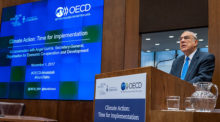Elaine Smith
“We are in a race against time,” Angel Gurría said during his November 1 lecture at the Munk School of Global Affairs, Climate Action: Time for Implementation.
Gurría, the Secretary-General of the Organisation for Economic Co-operation and Development (OECD), an intergovernmental economic organization founded to stimulate economic progress and world trade, addressed an audience of approximately 100 climate influencers, government and civil society representatives, researchers, students and faculty. He emphasized the need for swift global action on climate change. His speech was timely, given the November 6 opening of COP23, the annual meeting of the signatories to the United Nations Framework Convention on Climate Change (UNFCCC), being held this year in Bonn, Germany.
“It’s great to see how committed the OECD is about this,” said Professor Matthew Hoffmann, co-director of the Munk School’s Environmental Governance Lab. “The secretary-general has correctly diagnosed the challenges and provided a roadmap on how we can start thinking about overcoming them.”
Gurría wove current events into his speech as he discussed the main challenges of achieving the goals of the 2015 Paris Agreement, which was negotiated under the auspices of the UNFCCC.
“In 2016, carbon dioxide emissions grew by 3.3 per cent, compared to 2.2 per cent average growth during the past 10 years,” Gurría said. “A United Nations report points out that if we continue along these lines, come 2030, we’ll be 30 per cent above emissions targets.”
“These timely, useful indicators add to OECD’s call for urgency in addressing climate change. We need to get on with it. We are falling short. In 2015, we agreed on targets and even the most ambitious of those aren’t good enough.”
Gurría believes that one incentive to prod countries to take action is by marrying “two words: climate and growth.” He noted that fighting climate change can be a source of business, social and technological growth, “and OECD hopes to convince people of this fact.”
One major step that would go a long way toward meeting emissions targets would be for governments to “put a big, fat tax on carbon, even though politicians don’t like the word, tax, and turn to emissions trading schemes, which don’t work.”
He highlighted issues for countries to consider as implementation moves forward, such as looking beyond the national perspective to broader linkages.
“Countries can’t fight climate change alone,” Gurría noted, identifying some of the organizations besides countries that need to get involved, including businesses, insurance companies, cities and international organizations.
Faculty from the Munk School expressed support for OECD’s promise to take a broad and inclusive approach to tackling climate change, taking into account sustainability and lessons learned from Indigenous peoples and their care for the environment.
During the question and answer session, Professor John Robinson, U of T’s first presidential advisor on the environment, climate change and sustainability and a professor at both the Munk School and the School of the Environment, commented that “A big, fat tax on carbon emissions is absolutely right, and evidence that it isn’t politically toxic can be seen in British Columbia.”
“We need to broaden our thinking beyond climate change to sustainability, and we need a new narrative and greater degrees of community engagement.”
Professor Steven Bernstein, co-director of the Munk School’s Environmental Governance Lab, noted that the OECD has long been a leader on thinking about the issue of carbon pricing. “It’s great to see that the ‘big, fat tax’ is an idea they will push on a global scale,” he said after the lecture. “At the same time, we shouldn’t underestimate the challenge of getting in place all the other policies we need to make the kind of transformation to which the secretary-general referred work.”
November 6, 2017
